Clive Barker’s Jericho Review
Clive Barker’s Jericho
Jericho may well appeal to Clive Barker fans, but there's not much there for anyone else.
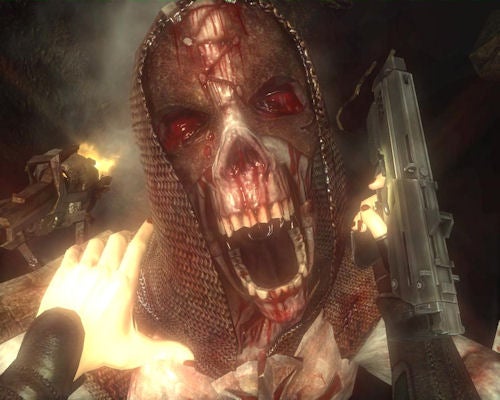
Verdict
Key Specifications
- Review Price: £34.89
”’Platforms: PC, Xbox 360, PlayStation 3 – Xbox 360 version reviewed.”’
When I previewed Clive Barker’s Jericho back in August, my main concern wasn’t that the game seemed like another ‘me too’ shooter (it didn’t) or that the game lacked promise (it had bags of it). No, my biggest worry was whether, in what was already looking like the best year we’ve had for 3D shooters in a long time, it had a chance of standing out. Could it live up to its potential, or would it fall short of the mark and flat on its face?
Having played the final product, the answer is less straightforward than I expected. In some respects, Jericho exceeds my first impressions. In others, it’s a much worse game than I feared. There are real signs here of innovative thinking and artistic and technical skill, but there’s also plenty of evidence of sloppy design, poor execution and clichéd or merely generic work. In a way, this actually makes me sadder than I’d be if Jericho was just your average damp squib.
If you read the preview, you’ll already know that the game is a squad-based shooter, but with the usual military guff exchanged for a dark, gory horror theme. The seven-strong Jericho squad – a secret military unit made up of warriors with psychic powers – is sent on a mission to close a dimensional rift before a horrific elder entity can be unleashed upon humanity. The rift is enclosed in what the characters describe as ‘the box’; a sort of trans-dimensional prison that protects it. The rift has actually opened several times during the lifetime of humanity, and each time it has dragged a warped version of the local architecture and population into the box. Hence, the Jericho squad’s journey falls into four themed acts, covering Barker-fied versions of World War II, the Crusades, Roman and Sumerian settings.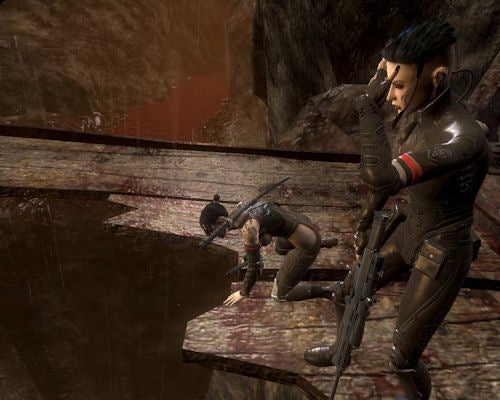
Funnily enough, the game’s real USP turns out not to be Barker’s story, which – frankly – doesn’t seem a million miles away from the X-Files meets Doom meets Cthulu meets Aliens nonsense that we’ve already seen a million times before. Nor is it the characters, who similarly conform to well established sci-fi and horror stereotypes. Instead, the USP turns out to be what the characters can do. As mentioned in the preview, each member of Jericho squad has his or her own specific weapons and powers. Delgado, for example, is a hulking guy in the Gears of War mode, armed with a hulking chaingun and able to unleash a fire spirit who can seek out and destroy enemies within visual range. Black is a sniper, but she also comes blessed with telekinetic powers with which she can shift barriers and steer bullets in slow motion to their target. Cole can slow down time, while Church can perform blood rites which anchor enemies to the spot or cause them to burst into flame. You’ll get to grips with all of them, as your initial playable character is finished off early on, but – ingeniously – survives by possessing his squad-mates. You can switch to another member of Jericho just by targeting that character and pressing X, or by pressing X then selecting using the D-Pad.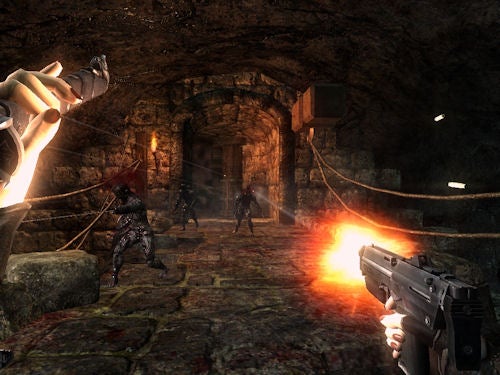
What didn’t come through in the preview was how complex and well developed these special abilities are, or how crucial they are to the game. Play Jericho as a straight 3D shooter and you won’t last five minutes; your enemies are too hard and too numerous. Meanwhile, the simple D-pad based command system and poor squad AI (much more on this subject later) make it equally impossible to play as a squad-based strategic shooter. The trick, then, is to switch rapidly between characters and use their powers as you need to in order to dispose of the hundreds of skull-faced zombies and grisly, half-metal mutants that swarm your way. 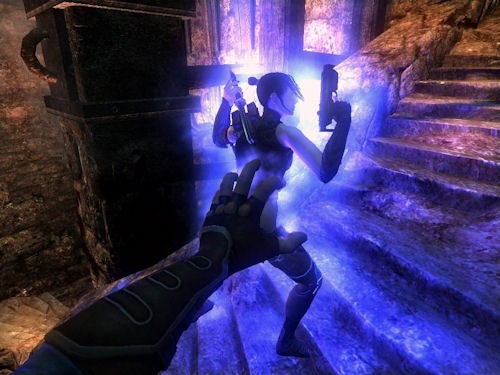
Faced with a gang of grinning bone-heads toting exploding crossbow bolts? Black can take them out one by one from a distance using her psychically-enhanced sniper skills. Flamethrowing enemies on the way? Use Delgado to take some of the heat off, then let the rest of the squad wipe them out. Why not see if Jones, your friendly seer, can possess a monster and use something nearby to cause disruption? Or maybe Church can hold that flying demon in place with a blood rite, so that the rest of the team can fill the agile little git with lead.
Jericho also makes a little effort to integrate these powers with other aspects of the gameplay, though these mainly come down to flicking a lever or taking a little solo run. At times, the game also deliberately splits the team, forcing you to engage with specific characters and capabilities you might normally ignore. Let’s be clear right now: there is some fun, imaginative stuff lurking here, and it has to be said that Jericho really doesn’t play or feel like the average FPS.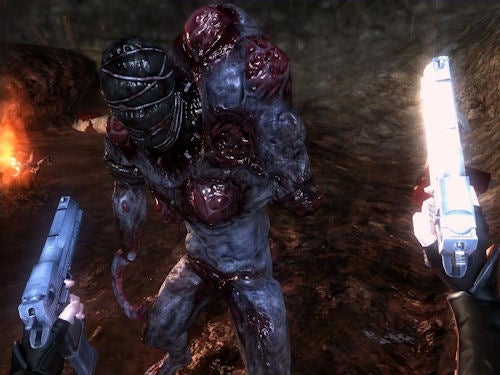
And while we’re spouting praise, let’s also state that the guys at MercurySteam can be proud of much of their visual work. Their custom engine is capable of some stunning results, and when the monsters, colours and architecture come together, as they do in the Crusade section of the game, Jericho reaches Gears of War levels of magnificence. Throw in some huge monsters, generally great creature design from the Clive Barker school of flayed skin and bloody organs, and you have a game that always looks good and often looks great – with one huge caveat that I’ll come to later on.
You see, for all the good stuff it’s impossible to ignore that Jericho simply isn’t actually all that entertaining a game.
Problem numero uno: AI. Your enemies don’t appear to have any, or at least any that has advanced significantly since the days of Quake II. That’s fine. We don’t expect Zombies to act smart, and the game would probably be impossible if they did. What is a problem is that your squad-mates are equally clueless. I’ve seen them standing with their back to a hail of bullets while they contemplate their next move. I’ve groaned as they each take it in turns to walk into the target-zone of a camped goon with explosive projectiles seemingly because they wanted to join their mates who had already been downed at the same spot. From the beginning, you’re assaulted by explosive zombie enemies, yet even hours on your troops haven’t learnt that a downed exploder always explodes one or two seconds after collapsing. Nor do they seem capable of targeting the yellow weak spot pustules on the beasts. These guys are meant to be seasoned veterans? Why, then, are they so thick?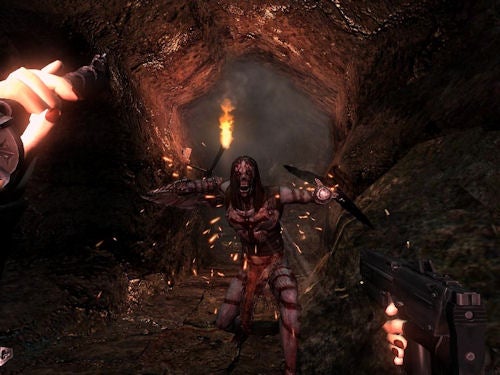
To soften this, Jericho throws in a Gears of War healing system whereby downed chums can be resurrected by getting close and hitting X. However, combine this with Jericho’s tendency to throw an endless stream of enemies at you, and at times the game turns into a farcical heal-em-up, where you race around like a headless chicken trying to keep as many of Jericho squad fighting fit as humanly possible – just because this is the best and only way to avoid another trip to the reload screen. 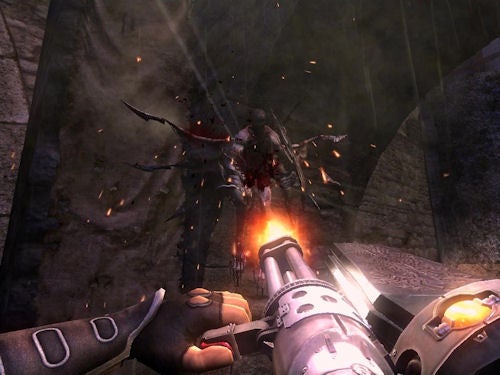
And sometimes you’ll fail, partly due to the sheer quantity and ridiculous bullet-resistance of even the most basic baddies, and partly due to the lemming-like tendencies of your squad. To make this really annoying, the checkpointing is often very poorly done, meaning you may face a repeated ten-minute trek through the same four battles every time your team goes down. Adding insult to injury, you have to go through a yes/no prompt every time you reload, and Jericho even throws in annoying in-game cinematics straight after some checkpoints, meaning you can enjoy the same weak lines of dialogue many times over.
Worse, this is a game that doesn’t need to get any more repetitive. The one major criticism of the art design is that each zone of ‘the box’ re-uses similar architecture over and over again, and that the game as a whole uses a very limited colour palette. It’s all very grim and gothic, but after a while black, red and brown get stale. Worse still, the game is structurally repetitive as well. It’s stupidly linear, and basically comes down to ‘squad enters new area, squad beats back hordes of baddies, repeat until level ends.’ It’s no coincidence that the times when the game takes wing are the times when it’s daring enough to ditch the formula and set up a more interesting encounter or a big boss battle. It’s like all the imagination went into the powers, leaving too little for what could and should be done with them.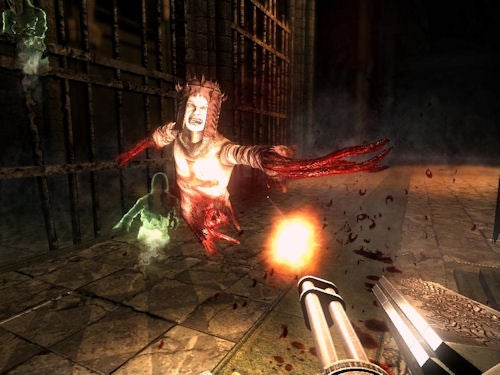
And, please, please, please, please – can we have no more games ruined by Quick Time Event sequences. Jericho has one within the first five minutes that sets your teeth on edge, then sporadically throws in more to make you grind them as the game progresses. The speed with which the button icon flashes on and off and the quickness of response required make each and every one a nightmare. Most annoyingly, at one point you’re forced to kill a creature you’ve already downed twice by other means using a QTE sequence just because the developers wanted to throw in a cinematic pay-off. Grrr…..
Now, I could probably live with some of these irritations, but the final problem Jericho has is atmosphere – it just doesn’t have enough of it. You’re clearly supposed to be intrigued by the game’s mythos and horrified by its dark visions, but after a while all the blood and viscera merges into the background, and you’re left focussing on the mechanics of getting from one battle to the next. Perhaps it’s not fair to compare it to survival horror titles when it has always pitched itself as a thriller, not a chiller, but Jericho never drags you into its weird netherworld in the way that a Silent Hill or Project Zero would. As an FPS, meanwhile, it’s nowhere near as nerve-wracking as Bioshock, Half-Life 2 or – ironically – Clive Barker’s previous game project, Undying.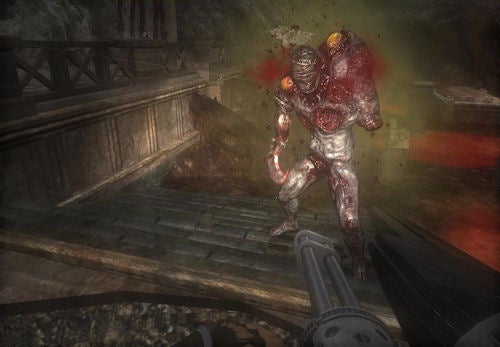
The end result, then, is a game packed with good ideas and boasting some impressive graphics, but ruined by poor execution and bad design. If you’re a huge fan of scary movies and of the Liverpudlian horror auteur and you absolutely must have it, my only advice is to persevere; the game does get better the more it goes on. However, my real advice at the moment would be simply not to bother. When you look at what’s out or coming out in the FPS genre, we’ve never had it so good. Good for us, tough for Jericho. However, even without the likes of Bioshock, The Darkness and The Orange Box around, I’d be hard pushed to give this game my whole-hearted recommendation.
”’Verdict”’
The design documentation was probably a great piece of work, but the minute-by-minute experience of Jericho is a let down. While the game does improve as it goes on, it’s too flawed and annoying to be worth your money.
Trusted Score
Features
| Genre | Action/Adventure |
| Player(s) | 1 |

